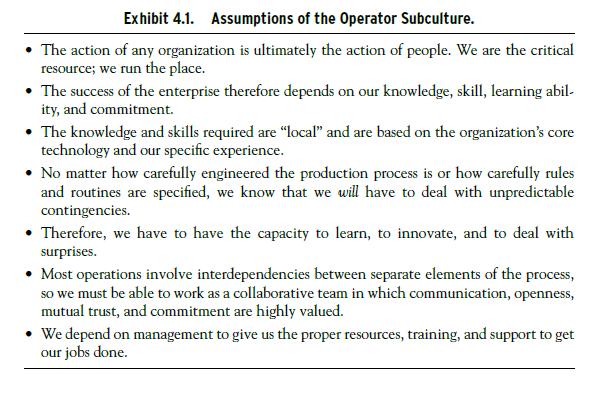All organizations have some version of what has been called “the line” as opposed to the “the staff,” referring to those employees who produce and sell the organization’s products or services. I will call these the “operators” to identify the employees who feel they run the place. They will be distinguished from the designers of the work, the “engineers,” and from the top executives whose function is to maintain the financial health of the organization. Some of the critical basic assumptions of the operator in all organizations are shown in Exhibit 4.1.
This subculture is the most difficult to describe because it evolves locally in organizations and within operational units. Thus, you can identify an operator subculture in a nuclear plant, in a chemical complex, in an auto manufacturing plant, in the cockpit, and in the office, but it is not clear what elements make this culture broader than the local unit. To get at this issue, we must consider that the operations in different industries reflect the broad technological trends in those industries. At some fundamental level, how someone does things in a given industry reflects the core technologies that created that industry. And as those core technologies themselves evolve, the nature of operations changes. For example, as Zuboff (1988) has persuasively argued, information technology has made manual labor obsolete in many industries and replaced it with conceptual tasks. In a chemical plant, the worker no longer walks around observing, smelling, touching, and manipulating. Instead he or she sits in a control room and infers the conditions in the plant from the various indexes that come up on the computer screen. But what defines this subculture across all of these examples is the sense that these employees have that they really run things, that they are the key to the functioning of the organization, the “front line.”

The operator subculture is based on human interaction, and most line units learn that high levels of communication, trust, and teamwork are essential to getting the work done efficiently. Operators also learn that no matter how clearly the rules are specified of what is supposed to be done under different operational conditions, the world is to some degree unpredictable and they must be prepared to use their own innovative skills to deal with it. If the operations are complex as in a nuclear plant, operators learn that they are highly interdependent and that they must work together as a team, especially when unanticipated events have to be dealt with. Rules and hierarchy often get in the way under unpredicted conditions. Operators become highly sensitive to the degree to which the production process is a system of interdependent functions all of which must work together to be efficient and effective. These points apply to all kinds of “production processes” whether we are talking about a sales function, a clerical group, a cockpit, or a service unit.
The operators know that to get the job done effectively, they must adhere to most of the assumptions stated previously, but because conditions are never quite the same as what their training had shown, all operators learn how to deviate from formal procedures, usually to get the job done but sometimes to subvert what they may regard as unreasonable demands from management. One of the most effective variations of this process is to “work to rule,” which means to do everything very precisely and slowly, thus making the organization very inefficient. An example that most travelers have experienced is when airline traffic controllers can practically paralyze the system by working strictly to rule.
The general phenomenon of adapting the formal work process to the local situation and then normalizing the new process by teaching it to newcomers has been called “practical drift” and is an important characteristic of all operator subcultures (Snook, 2000). It is the basic reason why sociologists who study how work is actually done in organizations always find sufficient variations from the formally designated procedures to talk of the “informal organization” and to point out that without such innovative behavior on the part of employees, the organization might not be as effective (Hughes, 1958; Dalton, 1959; Van Maanen, 1979b). The cultural assumptions that evolve around how work is actually done are often the most important parts of an organizational culture.
For example, as all observers of production units have learned, employees rarely work to their full capacity except under crisis conditions. More typically, norms develop of “a fair day’s work for a fair day’s pay,” and workers who work harder than this are defined as “rate busters” and are in danger of being ostracized. To fully understand how things work in a total organization, you must, therefore, observe the informal culture, which is the interplay of the various operator subcultures.
Source: Schein Edgar H. (2010), Organizational Culture and Leadership, Jossey-Bass; 4th edition.

Thanks for any other informative web site. Where else may I get that type of info written in such an ideal method? I’ve a challenge that I am simply now operating on, and I have been on the look out for such information.